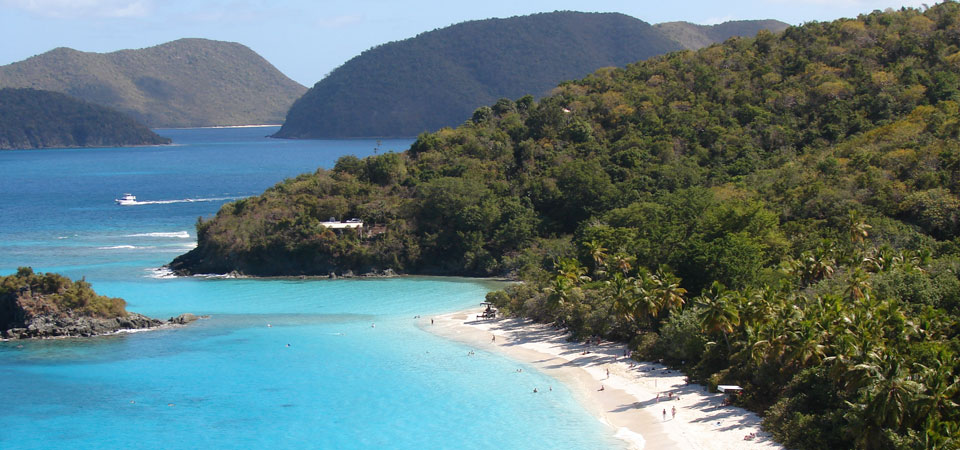How Important is the Ocean to U.S. Island Territories?
New ocean economy study focuses on Puerto Rico, U.S. Virgin Islands for answers.

The Big Picture
A new report allows readers to better understand the importance of the ocean to the economies of two U.S. territories in the Caribbean. For people who manage, protect, and make use of the resources in these special places, more accurate economic data about ocean use are key to good decision making. And good decisions will help keep our ocean healthy and resilient—supporting livelihoods for future generations. Shown here: St. John, U.S. Virgin Islands.
Just how important is the ocean to the economies of our U.S. island territories? It's a question that's not as easy to answer as you might imagine.
What's the problem?
U.S. territories and states are different in many ways, and these differences extend to economics. National statistics show the contribution of the ocean to the economies of Puerto Rico and the U.S. Virgin Islands—two locations examined in this new study—is about three to eight times greater than in the U.S. as a whole. However, these estimates are based on economic models geared towards U.S. states. NOAA economists have long suspected that these estimates are low. The new study, "Describing the Ocean Economies of the U.S. Virgin Islands and Puerto Rico," is the first step in getting to the bottom of how exactly island territory economies are different from those of coastal and Great Lakes states. Understanding these differences is the first step in a long-term goal to expand NOAA economic models to include all U.S. territories.
How are territories different?
U.S. territories are small, surrounded by the ocean, and heavily dependent on tourism—so it would make sense that many or most of the people who live in these places would depend on the ocean to a greater degree than in our larger, more diversified coastal states. The new study, commissioned by NOAA's Office for Coastal Management, confirms this. Ocean-based tourism is, as expected, much more important in territories than in states. But that's not all. The report also found that current economic models tend to underestimate ocean dependence in territories because there are many unique employment considerations in these island locations. For example, current estimates do not capture the sale of fish in informal community markets (which are far more common in territories). Part-time workers or ancillary businesses, such as travel agencies, are also a big part of the economy in the Caribbean. And there are a large number of self-employed people and a high percentage of informal economic activity in these regions that are not captured using current economic models. The findings of the study provide a more complete picture of the dependency of these island territories on the ocean.
Why should we care?
Millions of U.S. jobs depend on the resources of the ocean and Great Lakes. Many of these jobs also depend on the health of marine ecosystems—but these jobs also have the potential to harm the health of those ecosystems. We need to understand ocean dependency to make decisions that ensure that all jobs that rely on our ocean and Great Lakes continue to be sustainable in the future, while protecting our fragile ecosystems.
What's next?
NOAA economists now have the knowledge to build a more comprehensive methodology for capturing ocean-dependent economic activity in the U.S. Virgin Islands and Puerto Rico. This study will also provide a starting point for similar work in U.S. Pacific island territories.
Did you know?
NOAA's Economics: National Ocean Watch (ENOW) provides online data on six economic sectors that depend on the ocean and Great Lakes: living resources, marine construction, marine transportation, offshore mineral extraction, ship and boat building, and tourism and recreation. Data are available for 30 states and more than 400 coastal counties. The new U.S. Virgin Islands and Puerto Rico study is the first step in expanding the scope of ENOW so that it also includes island territories.
